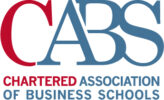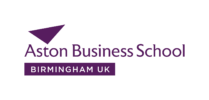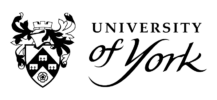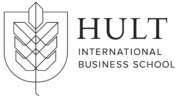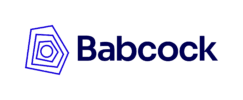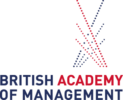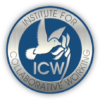Jack Jarvis’ research-industry collaboration for sustainable farming and healthy fish
Jack Jarvis shares his path to industry engagement
Our case study series features inspiring researchers discussing their careers and sharing tips on how they engage beyond academia. If you would like to be featured, send us an email at DBAA@exeter.ac.uk!
Jack Jarvis, third-year PhD student in Biosciences
In this case study, we speak to PhD student Jack Jarvis about how his work with fisheries continues to inform his research into rainbow trout health and growth.
Jack is a University of Exeter PhD student researching the impact of water quality on rainbow trout health and growth in UK fisheries. Part-funded by the British Trout Association, Jack’s research involves working closely with trout farms around the UK to perform water testing and, ultimately, producing recommendations on how to ensure optimal welfare and environmental sustainability on fish farms.
During the final year of Jack’s bachelor’s degree in biology he worked part-time at Exmoor fisheries, gaining valuable experience with the fish-farming industry, that led to a full-time role after graduating. When his undergraduate supervisor reached out to him with the details of a PhD project in water quality and aquaculture, Jack decided to return to academia while maintaining his strong ties with industry.
Growing up in Devon and living by the coast, I’ve always been interested in the aquatic environment and our impact on the water. That interest has only grown, particularly with the recent controversy around sewage releases. While studying biology at university, a lecture on aquaculture sparked an interest in the impact of the environment on animal health and performance.
I first looked into doing an internship at an agricultural research facility, working on crop development. I did that for a couple of weeks, and while I enjoyed it, I knew it wasn’t quite what I was looking for. The funny thing was, I missed the water, and I remembered how much I had enjoyed that aquaculture lecture. So, in the summer before the final year of my undergraduate degree, I searched online for ‘fish farms near me’ and found a trout farm on Exmoor. I reached out and within a week was on site doing a short work experience placement, and really enjoying it.
During my final year, I continued to work part-time at the farm alongside my studies. My dissertation was looking at water chemistry data from salmon farms in Scotland, so the practical experience I was getting through my work was really helpful.
By the end of my degree, I was a bit sick of education. I wanted to spend a couple of years working in industry before considering coming back to academia, so I went to work full time at the farm. Three months in, my undergraduate supervisor got in touch about a PhD looking at the effects of water chemistry on trout farming, thinking I’d be the perfect fit. While I wasn’t sure that I wanted to go back to academia, I also felt like I’d learnt everything I could from the small farm I was on. I like to be constantly learning, and I like the flexibility that research gives me, so I thought I’d apply and see what happens. I was accepted, and I’m now completing that project.
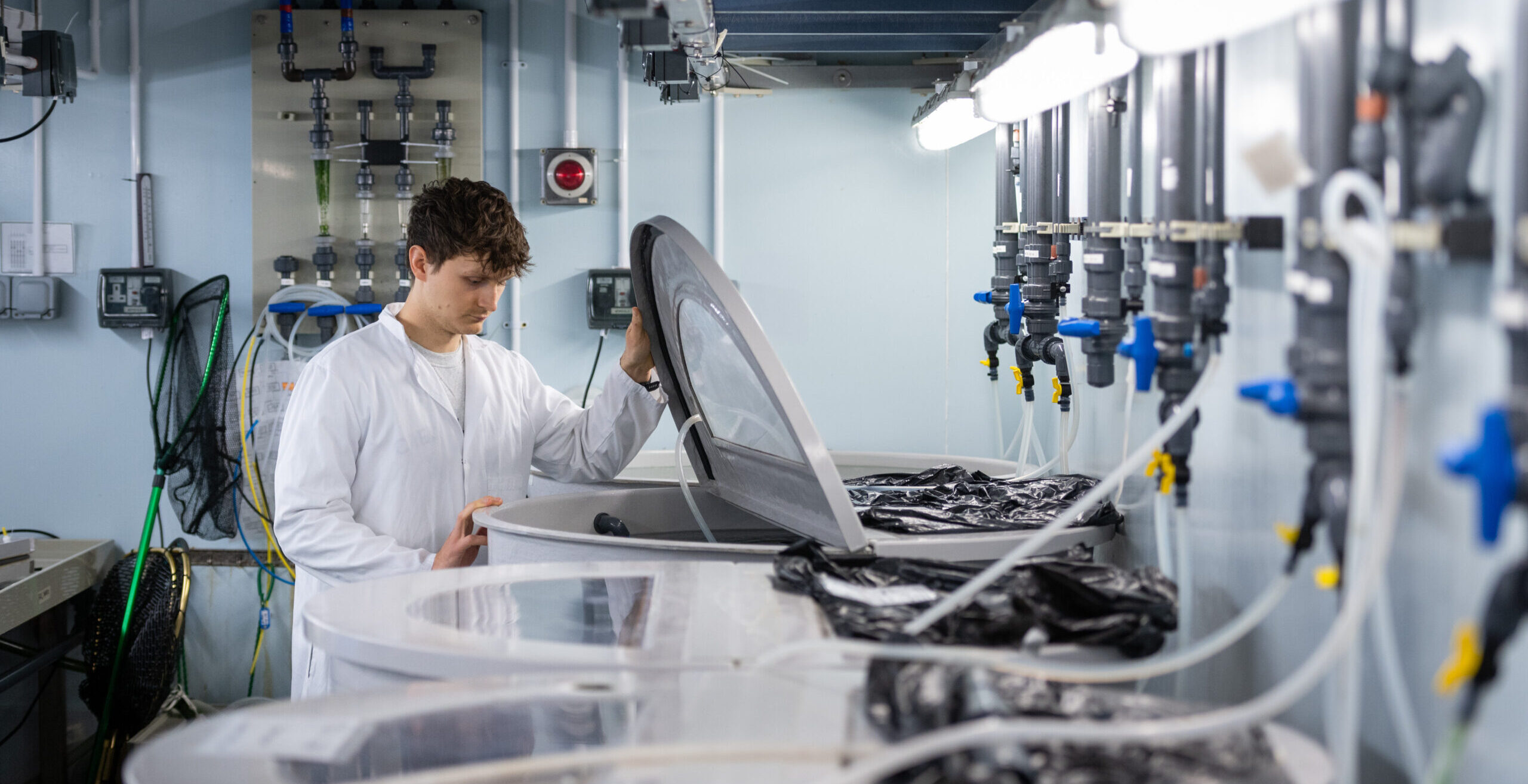
My research is looking at optimising water chemistry for trout farming in Recirculating Aquaculture Systems (‘RAS’). These are systems that recycle and treat the water coming into the farm, recirculating up to 99% of the water coming in. We wanted to find out more about the different methods and systems used by farmers across the UK. I worked with the British Trout Association to arrange conversations with farmers, visiting 32 of their 42 members.
I determined that most farms in the UK use ‘flow-through’ systems, with the water not being recycled or treated in the farms. Government reports and public water supply studies estimate that, by 2050, there could be a public water deficit of almost 5000 million litres per day, with water supply reductions being one of the main suggested strategies. Recirculating systems could really help with this, and my research is part of that conversation.
Denmark is ahead of the game in terms of these recirculating systems because of strict environmental regulations they’ve had since the 1990s. Through my contacts with British farmers, I was able to arrange a three-week trip to ten Danish trout farms to learn about how they are using these systems. With this data, I’ll be able to communicate with British farmers around transitioning from flow-through systems to recirculating systems, including potential challenges.
One of those challenges is about infrastructure. Recirculating systems treat water, for example, to remove carbon dioxide, phosphorous and nitrogen, which helps to protect waterways and reduce water use. However, they also demand a lot more electricity than flow-through systems. The UK doesn’t currently have the infrastructure to support recirculating systems, meaning they are very expensive to build and maintain, so it’s still being confirmed as a fully viable method of farming. By working with Danish farmers, I can help bring international best practice to British industry.
“I think it’s extremely important to be able to convey research to industry professionals, many of whom would be unlikely to read a scientific paper.”
Twice a year, I go to the regional British Trout Association meetings to give an update on my research and my future plans, sharing preliminary data with members before it’s published. I think it’s extremely important to be able to convey research to industry professionals, many of whom would be unlikely to read a scientific paper. You have to communicate differently than for a scientific audience. I talk about my own plans, and I also get feedback from them: what are the issues they’re having, what would they find interesting for me to look at?
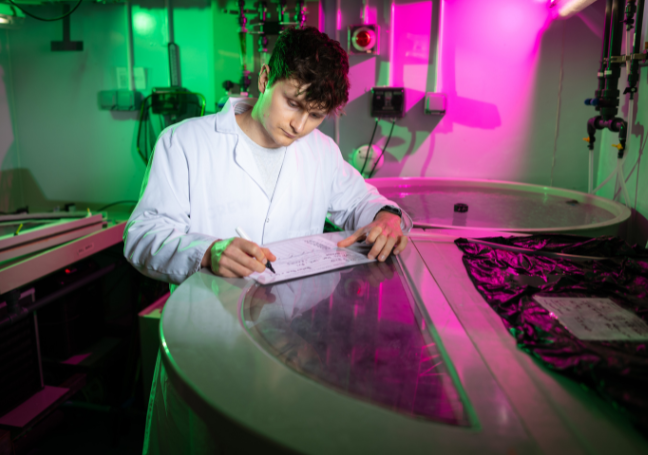
“Working with industry, I can very clearly see the link between my research and its effect on the world.”
Academia and industry are completely different environments. Having already worked in industry before my PhD, I am able to approach farmers with an understanding of their point of view. I find I can switch into the industry mindset when I’m visiting farms. Using the language of industry is really important: I can chat to farmers casually, drawing on an understanding of their day-to-day life, and this supports the more challenging conversations around my research. They can also see my enthusiasm, which helps.
“Being in academia gives me more influence on policy than I would have if I was in industry.”
At the end of my PhD, it will be my thesis that will have the final recommendations, but I hope to also communicate these through the British Trout Association and any aquaculture related conferences. I work with industry because I want my research to have an impact. My dream would be to affect policy, and I feel like being in academia gives me more influence on policy than I would have if I was in industry. My hope for the future is to be a voice for industry, supporting the middle ground between policy and industry. Working with industry, I can very clearly see the link between my research and its effect on the world.
Jack’s top tips for PhD students engaging beyond academia
- Be persistent. People in industry are busy, and you may need to work hard (and send multiple emails!) to demonstrate the benefits of collaborating with a researcher.
- Draw on your networks, and your network’s networks. You may not have all the links to industry already, but if you speak to your existing connections, they may be able to introduce you to the right people.
- Use LinkedIn. LinkedIn is an important way to strengthen and use your networks. If you post about what you’re doing, you’ll find relevant contacts reaching out to you that can really help in your research.
- Take every professional development opportunity. Take advantage of business development workshops, communication training and networking opportunities, even if they don’t seem relevant at first. As a PhD student, there are so many opportunities available to you beyond your research.
- Take the first step. Find ways of reaching out to industry to start the conversation.



